- Home
- Gustave Aimard
Balle-Franche. English
Balle-Franche. English Read online
Produced by Camille Bernard and Marc D'Hooghe athttps://www.freeliterature.org (Scans generously madeavailable by the Bodleian Library at Oxford)
THE PRAIRIE FLOWER
A TALE OF THE INDIAN BORDER
BY
GUSTAVE AIMARD,
AUTHOR OF
"THE INDIAN SCOUT," "TRAPPERS OF ARKANSAS," "TRAIL HUNTER,""GOLD SEEKERS," "BEE HUNTERS,"ETC., ETC.
LONDON:
CHARLES HENRY CLARKE, 13 PATERNOSTER ROW,
1874
CONTENTS
I. A HUNTING ENCAMPMENT II. A TRAIL DISCOVERED III. THE EMIGRANTS IV. THE GRIZZLY BEAR V. THE STRANGE WOMAN VI. THE DEFENCE OF THE CAMP VII. THE INDIAN CHIEF VIII. THE EXILE IX. THE MASSACRE X. THE GREAT COUNCIL XI. AMERICAN HOSPITALITY XII. THE SHE-WOLF OF THE PRAIRIE XIII. THE INDIAN VILLAGE XIV. THE RECEPTION XV. THE WHITE BUFFALO XVI. THE SPY XVII. FORT MACKENZIE XVIII. A MOTHER'S CONFESSION XIX. THE CHASE XX. INDIAN DIPLOMACY XXI. MOTHER AND DAUGHTER XXII. IVON XXIII. THE PLAN OF THIS CAMPAIGN XXIV. THE CAMP OF THE BLACKFEET XXV. BEFORE THE ATTACK XXVI. RED WOLF XXVII. THE ATTACK XXVIII. CONCLUSION
CHAPTER I.
A HUNTING ENCAMPMENT.
America is the land of prodigies! Everything there assumes giganticproportions, which startle the imagination and confound the reason.Mountains, rivers, lakes and streams, all are carved on a sublimepattern.
There is a river of North America--not like the Danube, Rhine, orRhone, whose banks are covered with towns, plantations, and time-worncastles: whose sources and tributaries are magnificent streams, thewaters of which, confined in a narrow bed, rush onwards as if impatientto lose themselves in the ocean--but deep and silent, wide as an armof the sea, calm and severe in its grandeur, it pours majesticallyonwards, its waters augmented by innumerable streams, and lazily bathesthe banks of a thousand isles, which it has formed of its own sediment.
These isles, covered with tall thickets, exhale a sharp or deliciousperfume which the breeze bears far away. Nothing disturbs theirsolitude, save the gentle and plaintive appeal of the dove, or thehoarse and strident voice of the tiger, as it sports beneath the shade.
At certain spots, trees that have fallen through old age, or havebeen uprooted by the hurricane, collect on its waters; then, attachedby creepers and concealed by mud, these fragments of forests becomefloating islands. Young shrubs take root upon them: the petunia andnenuphar expand here and there their yellow roses; serpents, birds, andcaimans come to sport and rest on these verdurous rafts, and are withthem swallowed up in the ocean.
This river has no name! Others in the same zone are called Nebraska,Platte, Missouri; but this is simply the _Mecha-Chebe_ the old fatherof waters, _the_ river before all! the Mississippi in a word!
Vast and incomprehensible as is infinity, full of secret terrors, likethe Ganges and Irrawaddy, it is the type of fecundity, immensity, andeternity to the numerous Indian nations that inhabit its banks.
* * * * *
Three men were seated on the bank of the river, a little below itsconfluence with the Missouri, and were breakfasting on a slice of roastelk, while gaily chatting together.
The spot where they were seated was remarkably picturesque. The bankof the river was formed of small mounds, enamelled with flowers. Thestrangers had selected for their halt the top of the highest mound,whence the eye embraced a magnificent panorama. In the foreground,dense curtains of verdure which undulated with each breath of air: onthe islands innumerable flocks of dark-winged flamingos, perched ontheir long legs, plovers and cardinals fluttering from bough to bough,while numerous alligators lazily wallowed in the mud. Between theislands, the silvery patches of water reflected the sunbeams. In themidst of these masses of coruscating light, fishes of every descriptionsported on the surface of the water, and traced sparkling furrows.Further back, as far as the eye could reach, the tops of the trees thatbordered the prairie, and whose dark green scarcely showed upon thehorizon.
But the three men we have mentioned seemed to trouble themselves veryslightly about the natural beauties that surrounded them, as theywere fully engaged in appeasing a true hunter's appetite. Their meal,however, only lasted a few minutes, and when the last fragments hadbeen devoured, one lighted his Indian pipe, the other took a cigarfrom his pocket. They then stretched themselves on the grass, andbegan digesting with that beatitude which characterizes smokers, whilefollowing with a languid eye the clouds of bluish smoke that rose inlong spirals with each mouthful they puffed forth. As for the thirdman, he leant his back against a tree, crossed his arms, on his chest,and went to sleep most prosaically.
We will profit by this momentary repose to present these persons to ourreaders, and make them better acquainted with each other. The first wasa Canadian half-breed, of about fifty years of age, and known by thename of "Bright-eye." His life had been entirely spent on the prairieamong the Indians, all of whose tricks he was thoroughly acquaintedwith.
Like the majority of his countrymen he was very tall, more than sixfeet in height: his body was thin and angular; his limbs were knotty,but covered with muscles, hard as ropes; his bony and yellow face hada remarkable expression of frankness and joviality, and his little greyeyes sparkled with intelligence; his prominent cheekbones, his nosebent down over a wide mouth supplied with long white teeth, and hisrounded chin, made up a face which was the most singular, and, at thesame time, the most attractive that could be imagined.
His dress differed in no respect from that of the other wood rangers;that is to say, it was a strange medley of European and Indianfashions, generally adopted by all the white prairie hunters andtrappers. His weapons consisted of a knife, a pair of pistols, and anAmerican rifle, now lying on the grass, but within reach of his hand.
His companion was a man of thirty to thirty-two years of age at themost, but who appeared scarce twenty-five, tall, and well made. Hisblue eyes, limpid as a woman's, the long light curls that escapedbeneath the edge of his Panama hat, and floated in disorder on hisshoulders, the whiteness of his skin, which contrasted with the oliveand brown complexion of the hunter, were sufficient evidence that hewas not born in the hot climate of America.
In fact, this young man was a Frenchman, Charles Edward de Beaulieu,and was descended from one of the oldest families in Brittany. But,under this slightly effeminate appearance, he concealed a lion'scourage which nothing could startle or even surprise. Skilled in allbodily exercises, he was also endowed with prodigious strength, and thedelicate skin of his white and unstained hands, with their rosy nails,covered nerves of steel.
The Count's dress would reasonably have appeared extraordinary in acountry remote from civilization to anyone who had leisure to examineit. He wore a hunting jacket of green cloth, of a French cut, andbuttoned over his chest; yellow doeskin breeches, fastened by a waistbelt of varnished leather; a cartouche box, and a hunting knife in abronzed steel sheath, and with an admirably chiselled hilt: while hislegs were covered by long riding boots, coming up over the knee. Likehis companion, he had laid his rifle on the grass: this weapon, richlydamascened, must have cost an enormous sum.
The Count de Beaulieu, whose father followed the princes into exileand served them actively, first in Conde's army and then in all theRoyalist plots that were incessantly formed during the Empire, was anultra-Royalist. Left an orphan at an early age, and possessed of animmense fortune, he was nominated a lieutenant in the Gardes du Corps.After the fall of Charles X., the Count, whose career was broken up,was ass
ailed by a fearful despondency, and an unenviable disregard forlife filled his heart. Europe became hateful to him, and he resolvedto bid it an eternal farewell. After intrusting the management of hisfortune to a confidential agent, the Count embarked for the UnitedStates.
But American life, narrow, paltry, and egotistic, was not made for him;for the young man understood the Americans no better than they didhim. His heart was ulcerated by the meanness and trickery he saw dailycommitted by the descendants of the Plymouth Brethren, so he one dayresolved to bury himself in the depths of the country, and visit thoseimmense prairies whence the first lords of the soil had been driven bythe cunning and treachery of their crafty despoilers.
The Count had brought with him from France an old servant of thefamily, whose progenitors, for many generations, had uninterruptedlyserved the Beaulieus. Before embarking, the Count imparted his plansto Ivon Kergollec, leaving him at liberty to remain behind or follow;the servant's choice was not long, he simply replied that his masterhad the right to do what he pleased without consulting him, and as itwas his duty to follow his master everywhere, he should do so. Evenwhen the Count formed the resolve of visiting the prairies, and thoughtit right to tell his servant his resolution, the answer was still thesame. Ivon was about forty-five years of age, and was a true type ofthe hardy, simple, and withal crafty Breton peasant; he was shortand stumpy, but his well-knit limbs and wide chest denoted immensestrength. His brick-coloured face was illumined by two small eyes,which sparkled with cleverness and flashed like carbuncles.
Ivon, whose life had been spent calmly and lazily in the gilded hallsof Beaulieu House, had gradually assumed the regular habits of anobleman's lackey; having had no occasion to prove his courage, he wascompletely ignorant of the possession of that quality, and, althoughduring the last few months he had been placed in many dangerouscircumstances while following his master, he was still at the samepoint, that is to say, he completely doubted himself, and had theinnate conviction that he was as cowardly as a hare; so nothing wasmore curious after a meeting with the Indians than to hear Ivon, whohad been fighting like a lion and performing prodigies of valour,excuse himself humbly to his master for having behaved so badly, as hewas not used to fighting.
It is needless to say that the Count excused him, while laughingheartily, and telling him as a consolation--for the poor fellow wasvery unhappy at this supposed cowardice--that the next time he wouldprobably do better, and that he would gradually grow accustomed to thislife, which was so different from that he had hitherto led. At thisconsolation the worthy man-servant would nod his head sorrowfully, andreply, with an accent of thorough conviction:--
"No, sir, I can never have any courage. I feel sure of it; it is a sadtruth, but I am a poltroon. I am only too well aware of it."
Ivon was dressed in a complete suit of livery, though, in regard topresent circumstances, he was, like his companions, armed to the teeth,and his rifle leant against the tree by his side.
Three magnificent horses, full of fire and blood, hobbled a few pacesfrom the hunters, were carelessly browsing on the climbing peas andyoung tree shoots.
We have omitted to mention two peculiarities of the Count. The firstwas, he always carried in his right eye a gold eyeglass, fastened roundhis neck by means of a black ribbon; the second, that he continuallywore kid gloves, which we confess, greatly to his annoyance, had nowgrown very dirty and torn.
And now, by what strange combination of chance were these three men,so differing in birth, habits, and education, met together some fiveor six hundred leagues from any civilized abode, on the banks of ariver, if not unknown, at any rate hitherto unexplored, seated amicablyon the grass, and sharing a breakfast which was more than frugal? Wecan explain this in a few words to the reader by cursorily describinga scene that occurred in the prairie about six months prior to thebeginning of our narrative.
Bright-eye was a determined man, who, with the exception of the timehe served the Hudson's Bay Company, had always hunted and trappedalone, despising the Indians too much to fear them, and finding inbraving them that delight which the courageous man experiences, when,alone and beneath the eye of Heaven, he struggles, confiding in hisown resources, against a terrible and unknown danger. The Indiansknew and feared him for many a long year. Many times they had comeinto collision with him, and they had nearly always been compelled toretreat, leaving several of their men on the field. Hence they hadsworn against the hunter one of those hearty Indian hatreds whichnothing can satiate save the punishment of the man who is the object ofit.
But as they knew with what sort of man they had to deal, and did notcare to increase the number of the victims he had already sacrificed,they resolved to await, with the peculiar patience characteristic oftheir race, the propitious moment for seizing their foe, and till thenconfine themselves to carefully watching all his movements, so as notto lose the favourable opportunity when it presented itself.
Bright-eye at this moment was hunting on the banks of the Missouri.Knowing himself watched, and instinctively suspecting a trap, he tookall the precautions suggested to him by his inventive mind and the deepknowledge he possessed of Indian tricks. One day, while exploring thebanks of the river, he fancied he noticed, a slight distance aheadof him, an almost imperceptible movement in the thick brushwood. Hestopped, lay down, and began crawling gently in the direction of thethicket. Suddenly the forest seemed agitated to its most unexploreddepths, A swarm of Indians rose from the earth, leaped from the trees,or rushed from behind rocks; the hunter, literally buried beneath themass of his enemies, was reduced to a state of powerlessness, before hecould even make an attempt to defend himself.
Bright-eye was disarmed in a twinkling; then a chief walked up to him,and holding out his hand, said coldly--
"Let my brother rise; the Redskin warriors are waiting for him."
"Good, good," the hunter growled; "all is not over yet, Indian, and Ishall have my revenge."
The chief smiled.
"My brother is like the mockingbird," he said ironically; "he speakstoo much."
Bright-eye bit his lips to keep back the insult that rose to them; hegot up and followed his victors. He was a prisoner to the Piekanns,the most warlike tribe of the Blackfeet; and the chief who had takenhim was his personal enemy. The chief's name was _Natah Otann_ (theGrizzly Bear). He was a man of five-and-twenty at the most, with a fineintelligent face, bearing the imprint of honesty. His tall figure,well-proportioned limbs, the grace of his movements, and his martialaspect, rendered him a remarkable man. His long black hair, carefullyparted, fell in disorder on his shoulders; like all the renownedwarriors of his tribe, he wore on the back of his head an ermine skin,and round his neck bears' claws mingled with buffalo teeth, a verydear and highly-honoured ornament among the Indians. His shirt ofbuffalo hide, with short sleeves, was decorated round the neck with aspecies of collar of red cloth, ornamented with fringe and porcupinequills; the seams of the garment were embroidered with hair taken fromscalps, the whole relieved by small bands of ermine skin. His moccasinsof different colours, were loaded with very elegant embroidery, whilehis buffalo hide robe was quilted inside with a number of clumsydesigns, intended to depict the young warrior's achievements.
Natah Otann held in his right hand a fan made of a single eagle's wing,and, suspended round the wrist from the same hand by a thong, theshort-handled long-lashed whip peculiar to the prairie Indians; on hisback hung his bow and arrows in a quiver of a jaguar's skin; at hiswaist a bullet bag, his powder flask, his long hunting knife, and hisclub. His shield hung on his left hip, while his gun lay across theneck of his horse, which wore a magnificent panther skin for a saddle.The appearance of this savage child of the woods, whose cloak and longplumes fluttered in the wind, curveting, on a steed as untamed ashimself, had something about it striking, and, at the same time, grand.
Natah Otann was the first sachem of his tribe. He made the hunter asign to mount a horse one of the warriors held by the bridle, and thewhole party proceeded at a
gallop towards the camp of the tribe. Theyrode onward in silence, and the chief seemed to pay no attention to hisprisoner. The latter, free in appearance, and mounted on an excellenthorse, made not the slightest attempt to escape; at a glance he hadjudged the position, saw that the Indians did not lose sight of him,and that he should be immediately recaptured if he attempted flight.The Piekanns had formed their camp on the slope of a wooded hill.For two days they seemed to have forgotten their prisoner, to whomthey never once spoke. On the evening of the second day, Bright-eyewas carelessly walking about and smoking his pipe, when Natah Otannapproached him.
"Is my brother ready?" he asked him.
"For what?" the hunter said, stopping and pouring forth a volume ofsmoke.
"To die," the chief continued, laconically.
"Quite."
"Good; my brother will die tomorrow."
"You think so," the hunter replied with great coolness.
The Indian looked at him for a moment in amazement; then he repeated,"My brother will die tomorrow."
"I heard you perfectly well, chief," the Canadian said, with a smile;"and I repeat again, do you believe it?"
"Let my brother look," the sachem said, with a significant gesture.
The hunter raised his head.
"Bah!" he said, carelessly; "I see that all the preparations are made,and conscientiously so, but what does that prove? I am not dead yet, Isuppose."
"No, but my brother will soon be so."
"We shall see tomorrow," Bright-eye answered, shrugging his shoulders.
And leaving the astonished chief, he lay down at the foot of a treeand fell asleep. His sleep was so real, that the Indians were obligedto wake him next morning at daybreak. The Canadian opened his eyes,yawned two or three times, as if going to put his jaw out, and got up.The Redskins led him to the post of torture, to which he was firmlyfastened.
"Well!" Natah Otann said, with a grin, "what does my brother think atpresent?"
"Eh!" Bright-eye answered, with that magnificent coolness which neverdeserted him, "do you fancy that I am already dead?"
"No, but my brother will be so in an hour."
"Bah!" the Canadian said, carelessly; "many things can happen within anhour."
Natah Otann withdrew, secretly admiring the intrepid countenance of hisprisoner; but, after taking a few steps, he reflected, and returned toBright-eye's side.
"Let my brother listen," he said, "a friend speaks to him."
"Go on, chief, I am all ears."
"My brother is a strong man; his heart is great," Natah Otann said; "heis a terrible warrior."
"You know something of that, chief, I fancy," the Canadian replied.
The sachem repressed a movement of anger.
"My brother's eye is infallible, his arm is sure," he went on.
"Tell me at once what you want to come to, chief, and don't waste yourtime in your Indian beating round the bush."
The chief smiled as he said, in a gentler voice, "Bright-eye is alone;his lodge is solitary. Why has not so great a warrior a companion?"
The hunter fixed a searching glance on the speaker.
"What does that concern you?" he said.
Natah Otann continued,--
"The nation of the Blackfeet is powerful; the young women of thePiekann tribe are fair."
The Canadian quickly interrupted him.
"Enough, chief," he said; "in spite of all your shiftings to reach yourpoint, I have guessed your meaning; but I will never take an Indiangirl to be my wife; so you can refrain from further offers, which willnot have a satisfactory result."
Natah Otann frowned.
"Dog of the palefaces," he cried, stamping his foot angrily, "thisnight my young men will make war whistles of thy bones, and will drinkthe firewater out of thy skull."
With this terrible threat, the chief finally quitted the hunter, whoregarded him depart with a shrug, and muttered, "The last word isnot spoken yet; this is not the first time I have found myself ina desperate position, but I have escaped; there are no reasons whyI should be less lucky today. Hum! this will serve me as a lesson:another time I will be more prudent."
In the meantime the chief had given orders to begin the punishment,and the preparations were rapidly made. Bright-eye followed all themovements of the Indians with a curious eye, as if he were a perfectlyunconcerned witness.
"Yes, yes," he went on, "my fine fellows, I see you; you are preparingall the instruments for my torture; there is the green wood intendedto smoke me like a ham; you are cutting the spikes you mean to run upunder my nails. Eh, eh!" he added, with a perfect air of satisfaction;"you are going to begin with firing; let's see how skilful you are.Ah, what fun it is for you to have a white hunter to torture. The Lordknows what strange ideas may be passing through your Indian noddles;but I recommend you to make haste, or it is very possible I may escape."
During this monologue, twenty warriors, the most skilful of the tribe,had ranged themselves about one hundred yards from the prisoner; thefiring commenced; the balls all struck within an inch of the hunter'shead, who, at each shot, shook his head like a drowned sparrow, to thegreat delight of the spectators. This amusement had gone on for sometwenty minutes, and would probably have continued much longer, so greatwas the fun it afforded the Blackfeet; when suddenly a horseman boundedinto the centre of the clearing, dispersed the Indians in his way byheavy blows of his whip, and profiting by the stupor occasioned by hisunexpected appearance, galloped up to the prisoner, got down, quicklycut the thongs that bound him, thrust a brace of pistols in his hand,and remounted. All this was done in less time than it has taken us towrite it.
"By Tobias!" Bright-eye joyfully exclaimed, "I was quite sure I wasn'tgoing to die this time."
The Indians are not the men to allow themselves to be long subduedby any feeling; the first moment of surprise past, they surroundedthe horseman, shouting, gesticulating, and brandishing their weaponsfuriously.
"Come, make way there, you scoundrels," the newcomer shouted in acommanding voice, lashing violently at those who had the imprudence tocome too near him. "Let us be off," he added, turning to the hunter.
"I wish for nothing better," the latter made answer; "but it does notseem easy."
"Bah! let us try it, at any rate," the stranger continued, carefullyaffixing his glass in his eye.
"We will," Bright-eye said cheerfully.
The stranger who had so providentially arrived, was the Count deBeaulieu, as our readers will probably have conjectured.
"Hilloh!" the Count shouted loudly, "come here, Ivon."
"Here I am, my lord," a voice answered from the forest; and a secondhorseman, leaping into the clearing, coolly ranged himself by the sideof the first.
There was something strange in the group formed by these three stoicalmen in the midst of the hundreds of Indians yelling around them. TheCount, with his glass in his eye, his haughty glance, and disdainfullip, was setting the hammer of his rifle. Bright-eye, with a pistol ineach hand, was preparing to sell his life dearly, while the servantcalmly awaited the order to charge the savages. The Indians, furiousat the audacity of the white men, were preparing, with multitudinousyells and gestures, to take a prompt vengeance on the men who had soimprudently placed themselves in their power.
"These Indians are very ugly," the Count said; "now that you are free,my friend, we have nothing more to do here, so let us be off."
And he made a sign, as if to force a passage. The Blackfeet movedforward.
"Take care," Bright-eye shouted.
"Nonsense," the Count said, shrugging his shoulders, "can these scampsintend to bar the way?"
The hunter looked at him with the air of a man who does not knowexactly if he has to do with a madman or a being endowed with reason,so extraordinary did this remark seem to him. The Count dug his spursinto his horse.
"Well," Bright-eye muttered, "he will be killed, but for all that he isa fine fellow: I will not leave him."
In truth it was a critical
moment: the Indians, formed in close column,were preparing to make a desperate charge on the three men--a chargewhich would, probably, be decisive, for the Europeans, without shelter,and entirely exposed to the shots of their enemies, could not hope toescape. Still, that was not the Count's conviction. Not noticing thegestures and hostile cries of the Redskins, he advanced towards them,with his glass still in his eye. Since the Count's apparition, theIndian sachem, as if struck with stupor at the sight, had not madea move, but stood with his eyes fixed upon him, under the influenceof extraordinary emotion. Suddenly, at the moment when the Blackfeetwarriors were shouldering their guns, or fitting their arrows to thebows, Natah Otann seemed to form a resolution: he rushed forward, andraising his buffalo robe,--
"Stop!" he shouted, in a loud voice.
The Indians, obedient to their chiefs voice, immediately halted. Thesachem took three steps, bowed respectfully before the Count, and saidin a submissive voice:--
"My father must pardon his children, they did not know him: but myfather is great, his power is immense, his goodness infinite: he willforget anything offensive in their conduct toward him."
Bright-eye, astonished at this harangue, translated it to the Count,honestly confessing that he did not understand what it meant.
"By Jove!" the Count replied, with a smile, "they are afraid."
"Hum!" the hunter muttered, "that is not so clear: it is somethingelse; but no matter, it will be diamond cut diamond."
Then he turned to Natah Otann.
"The great pale chief," he said, "is satisfied with the respect his redchildren feel for him: he pardons them." Natah Otann made a movement ofjoy. The three men passed through the ranks of the Indians, and buriedthemselves in the forest, their retreat being in no way impeded.
"Ouf!" Bright-eye said, as soon as he found himself in safety, "I'mwell out of that; but," he added shaking his head, "there is somethingextraordinary about the matter, which I cannot fathom."
"Now, my friend," the Count said to him, "you are free to go whitheryou please."
The hunter thought for an instant. "Bah!" he replied, after a fewmoments had passed, "I owe you my life. Although I do not know you, youstrike me as a good fellow."
"You flatter me," the Count remarked, smiling.
"My faith, no; I say what I think. If you are agreeable we will staytogether, at any rate until I have acquitted the debt I owe you bysaving your life in my turn."
The Count offered him his hand.
"Thanks, my friend," he said, much moved; "I accept your offer."
"That is settled, then," the hunter joyfully exclaimed, as he pressedthe offered hand.
Bright-eye, at first attached to the Count by gratitude, soon feltquite a paternal affection for him. But he understood no morethan the first day the young man's behaviour, for he acted underall circumstances as if he were in France, and, by his rashness,universally foiled the hunter's Indian experience. This was carriedso far, that the Canadian, superstitious like all primitive natures,soon grew into the persuasion that the Count's life was protected by acharm, so many times had he seen him emerge victoriously from positionsin which anyone else would have infallibly succumbed.
At length, nothing appeared to him impossible with such a companion,and the most extraordinary propositions the Count made him seemedperfectly feasible, the more so as success crowned all theirenterprises by some incomprehensible charm, and in a way contrary toall foresight. The Indians, by a strict agreement, had given up allcontests with them, and even avoided any contact: if they perceivedthem at any time, all the Redskins, whatever tribe they might belongto, treated the Count with the utmost deference, and addressed him withan expression of terror mingled with love, the explanation of which thehunter sought in vain, for none of the Indians could or would give it.
This state of things had lasted for six months up to the moment when wesaw the three men breakfasting on the banks of the Mississippi. We willnow take up our story again at the point where we left it, terminatingour explanation, which was indispensable for the right comprehension ofwhat follows.

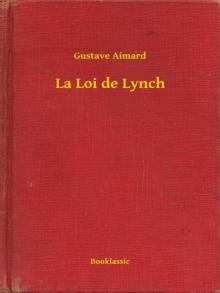 La loi de lynch. English
La loi de lynch. English The Guide of the Desert
The Guide of the Desert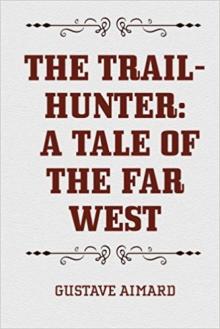 The Trail-Hunter: A Tale of the Far West
The Trail-Hunter: A Tale of the Far West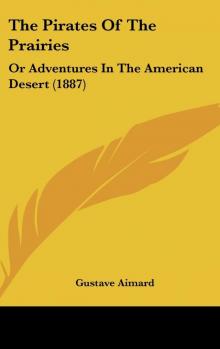 The Pirates of the Prairies: Adventures in the American Desert
The Pirates of the Prairies: Adventures in the American Desert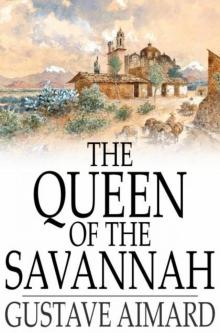 The Treasure of Pearls: A Romance of Adventures in California
The Treasure of Pearls: A Romance of Adventures in California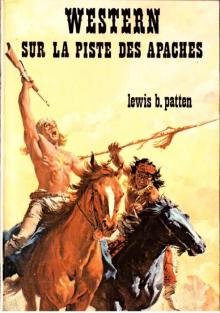 Les outlaws du Missouri. English
Les outlaws du Missouri. English Les trappeurs de l'Arkansas. English
Les trappeurs de l'Arkansas. English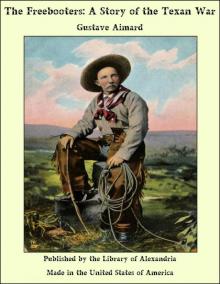 The Border Rifles: A Tale of the Texan War
The Border Rifles: A Tale of the Texan War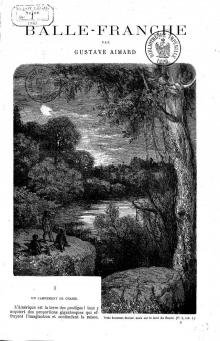 Balle-Franche. English
Balle-Franche. English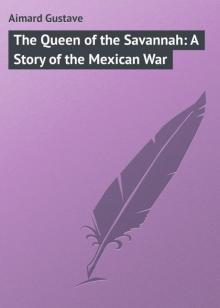 The Queen of the Savannah: A Story of the Mexican War
The Queen of the Savannah: A Story of the Mexican War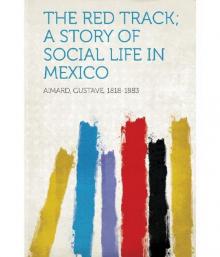 The Red Track: A Story of Social Life in Mexico
The Red Track: A Story of Social Life in Mexico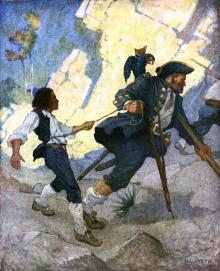 La fièvre d'or. English
La fièvre d'or. English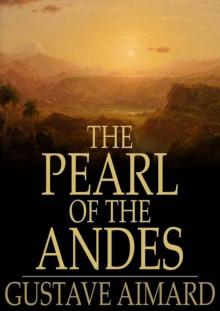 The Pearl of the Andes: A Tale of Love and Adventure
The Pearl of the Andes: A Tale of Love and Adventure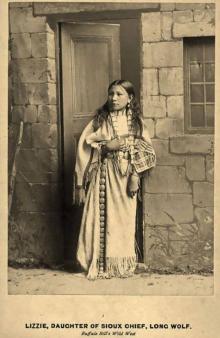 Les fils de la tortue. English
Les fils de la tortue. English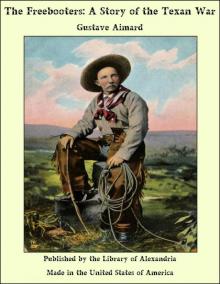 The Indian Chief: The Story of a Revolution
The Indian Chief: The Story of a Revolution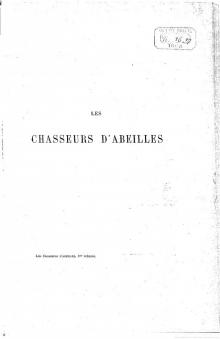 Les chasseurs d'abeilles. English
Les chasseurs d'abeilles. English The Adventurers
The Adventurers